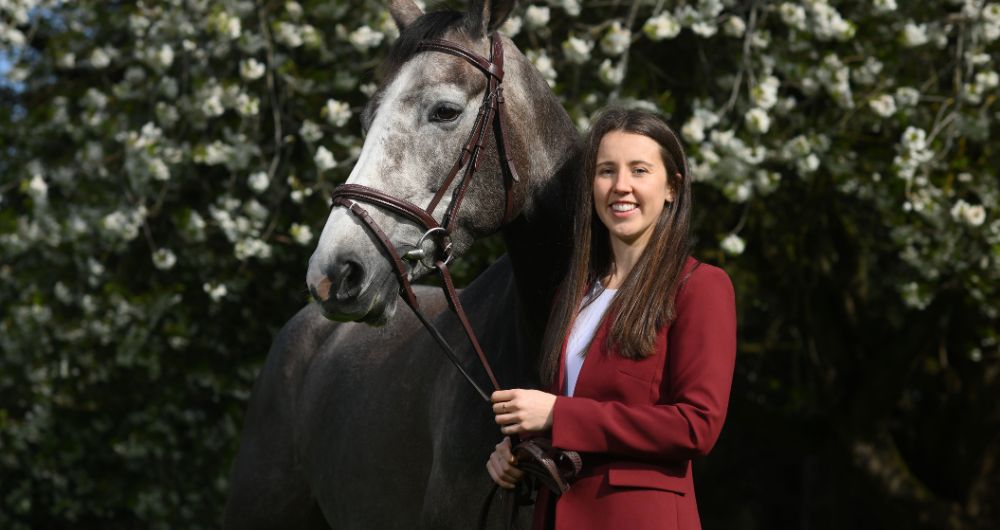
Dr Sonja Egan is a 2019 Insight Alum. She is now Head of Breeding Innovation and Development at Horse Sport Ireland. She completed her PhD at University College Dublin in 2019, supported by the Irish Research Council’s Government of Ireland Postgraduate Scholarship and the UCD Institute for Sport and Health.
‘I have a pragmatic approach to my research and that has transferred to my current role, I see the benefit of research as applied, and that is something that was instilled during my time in Insight. My Supervisor, Assist. Prof. Denise McGrath is a funded investigator in Insight and was integral in securing funding for Insight 1 and now Insight 2. Prof. Brian Caulfield was on my Doctoral Studies Panel and helped me to leverage the knowledge and supports within Insight, improving the quality of my work.
‘During my PhD at UCD I was awarded an interdisciplinary fund for my research. I actively collaborated across three schools in UCD (School of Public Health Physio and Sport Science, Veterinary and Engineering). It was here that I became an Insight member and an active participant in the weekly Friday weekly meetings. These meetings looked at specific research-applied problems and allowed me to question other research methods/plans/outputs but also learn from my peers who had a diverse range of expertise (anthropologists, data analysts, biostatisticians, engineers, sport scientists, physiotherapists – I’m probably safe enough in being the only horse expert so far!) These meetings really helped me to consider the wider implications of a research methodology, how to apply sensing tools and how to contextualise the bigger picture within my research. During my quantitative experimental work, I had access to 24 of Insight’s inertial sensors, and used these to concurrently collect data from 8 horses over a 12-week period. This data set was further complemented by stable-based camera footage and a range equine biomarkers. This comprehensive dataset facilitated the simultaneous capturing and analysis of equine gait, behaviour, joint inflammation, and postural sway. The qualitative aspect of my research was industry stakeholder focused; how do they currently analyse equine gait, their awareness of supportive technologies and their perspectives on application.
‘I did extensive collaborative work with other Insight members including Sean Drummond who supported the identification and implementation of method for equine sensor data cleaning, programming and segmentation in preparation for analysis; Cathy Goulding supported bespoke analysis coding to validate my data and analytics approach (equine postural sway – second paper to publish in this area and the first to use a sensor to do so) andProf. Andrew Parnell who contributed a novel statistical analysis and the application of nonlinear analysis for my equine behavioural research.’
‘I am the Head of Breeding, Innovation and Development at Horse Sport Ireland. I joined Horse Sports Ireland in 2019 (completing the last 6 month of my PhD part time) as a Breeding Policy executive. I took up the interim head role in Jan 2022 and full appointment in June.
‘In this role I oversee all National Breeding Services (schemes, research, knowledge transfer and engagement activities) to the entire sport horse industry. Our current flagship project is the integration of equine genotyping during pedigree analysis. This will enable genomic based breeding decisions for Irish breeders. Ireland will be the first country in the world to apply this technology across their sport horse herd.
‘I oversee five Sport Horse Studbooks – passports (Irish Sport Horse, Irish Draught Horse, Irish Cob, Irish Part bred Cob and Irish Sport Pony) and their related activities (Equine Technical support funding list). I am also head of the Coaching and education Department which delivers a range of coaching and education programmes to the industry, from grassroots to high performance.
‘Insight helped me to further develop my critical thinking skills. The research-application focus gave me an appreciation of the bigger picture and how to leverage this analytically in my decision making. I am also much better positioned to understand the needs of work-related funding applications, schemes, research projects, education pathways and so-on. It has also enabled me to seek out collaborators that can support these activities in my day-to-day role.’